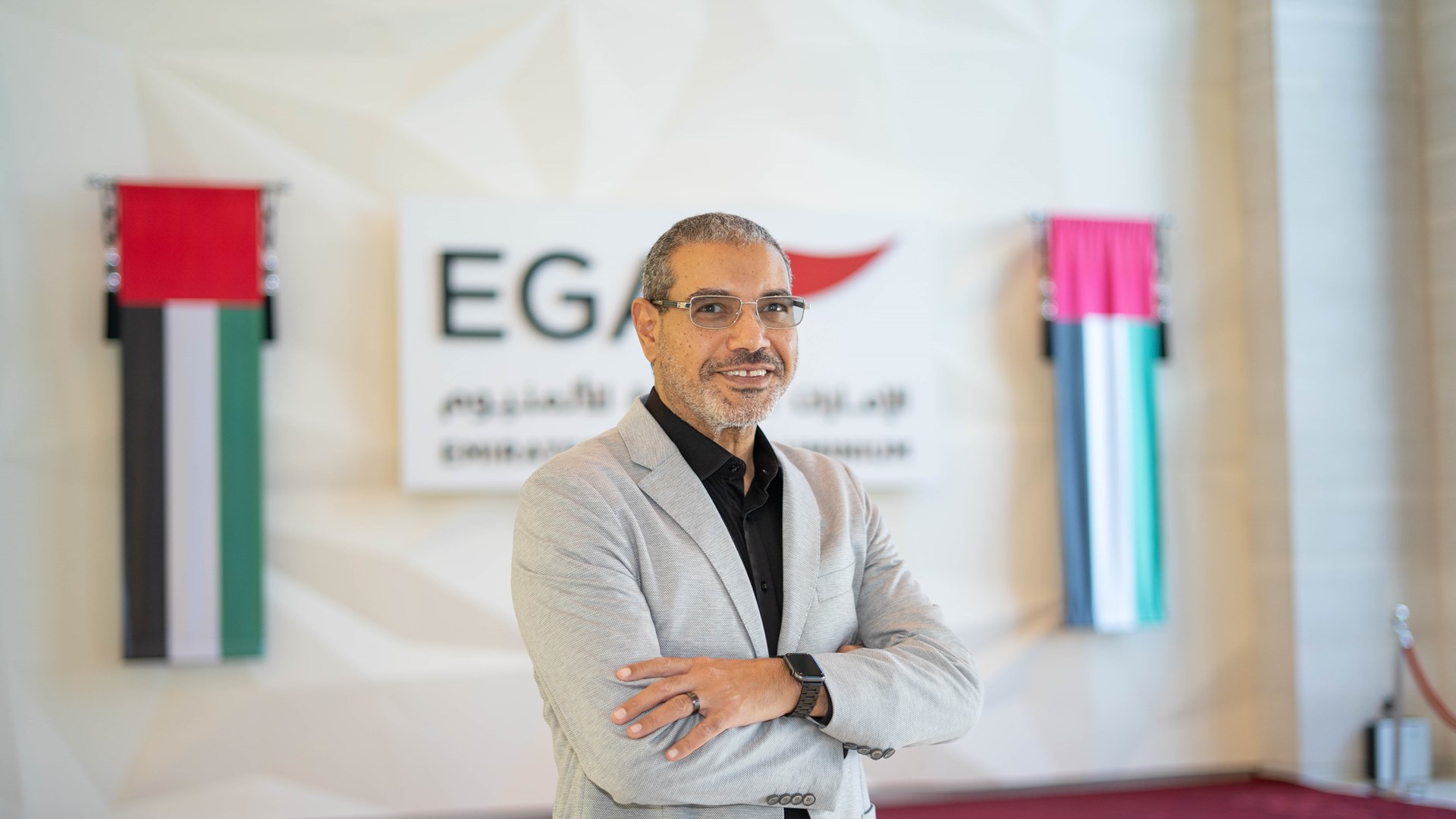
Innovation in action
How Dr. Mohamed Mahmoud is collaborating with the brightest minds at renowned universities to ensure EGA is always top of the class
Ask Dr. Mohamed Mahmoud, the manager of Emirates Global Aluminium’s Technology Centre of Excellence, how his work revolves around the company’s bold aspiration of ‘innovating the future of aluminium production’ and he answers emphatically.
The Centre of Excellence works with academia and others on blue-sky thinking. Since 2017, the Centre of Excellence has hosted five editions of Al Robot, a competition that challenges students from UAE universities and higher education institutions to design and construct prototype industrial robots for deployment at EGA’s aluminium smelters.
Mohamed receives around 10 to 15 proposals every year, and selects three to five teams to receive AED50,000 to build a prototype that they then build and try out at EGA’s smelters.

“If we find an implementable solution, then we deliver this to our operational teams to implement it directly,” says Mohamed.
This occurred in the most recent edition, where students were challenged to design and build a robot to measure the thickness of materials within EGA’s reduction cells, a task that had been performed manually. The American University of Dubai team’s winning entry was called Robot for Anode Cover Thickness (R FACT). It applied artificial intelligence to interpret images and successfully automated the task.
But befitting a company that delivers by maintaining its focus on sustainability, the AI Robot competition sees nothing go to waste.
“If we don’t find an implementable solution,” the Egyptian national says, “we think of the ideas as inspiration and find ways to implement them ourselves.
“That,” Mohamed emphatically adds of Al Robot, “is real innovation.”
The next edition of the competition provides another opportunity for Mohamed to unleash his passion for acquiring knowledge and practical solutions through collaboration with academia. One only needs a short period of time with him to realize how passionate he is about his work at the Centre of Excellence, which includes working with vendors and international companies to bring new technologies to EGA.
Mohamed, who joined EGA in 2010, is in charge of conducting research projects with academia locally and abroad, with the main objective of this side of his role being to combine the latest academic thinking with EGA’s industrial expertise.
Collaboration with renowned international universities plays a key part in the work Mohamed does. Successful partnerships include institutions “specialised in aluminium smelting” such as the University of New South Wales in Australia.

Another collaboration is with the world-renowned Massachusetts Institute of Technology (MIT) in the USA. Every year, EGA hosts around nine PhD and Masters’ students from MIT. “They come here for two months to work on research projects, working with EGA operational teams on technical matters,” Mohamed explains. “We work with very smart students. They come to EGA to work with our operations teams on specific research projects that can convey their theoretical knowledge into practice, and they come up with new ideas that add value to our operations.”
One specific example of a collaboration between EGA and MIT bearing fruit, Mohamed recalls, saw EGA improve energy efficiency in the power plant and enhance reduction technology in pot design.
Another example of a collaboration with MIT saw the detailed technical study of spent pot lining (SPL) used as additives in the cement industry. “This resulted in not just an environmental benefit, which, as a sustainable organisation is hugely important to EGA, but an economic benefit to the cement industry too,” comments Mohamed.
In any collaboration between the industrial experience of EGA and the knowledge power of an academic institution, Mohamed’s role is to “manage the project by working with one team from the operations area and one team from the university”.
He stresses: “It is important for EGA to work with academia because they add value to us, and we add value to them. It really is a win-win situation. We bring the latest academic thinking to EGA, and we incorporate the research environment to our people in operations. By dealing with bright, young minds, they are exposed to a lot of new information and new technologies. That adds value to our operations.”
Mohamed’s own academic experiences left a lifelong appreciation of education, learning and knowledge. He received his undergraduate degree in Chemical Engineering in 1991 from Minia University in Egypt and then his Master’s degree in Materials Science and Engineering from Imperial College London in 1999 after earning a full scholarship. His PhD was awarded five years later in Materials Science and Engineering from NTNU (The Norwegian University of Science and Technology).
“Studying in Europe was an amazing opportunity for me,” says Mohamed. “Instead of just reading their papers, reading their books, and learning from them at a distance, I was supervised and got to work with people who are the monster minds of our industry.”
Before joining EGA, he worked for Egyptalum in his native country for 17 years. His final position at the company was in the role of R&D General Manager.
Away from work, Mohamed is a keen football player who starred for school and university teams at left midfield and still pulls the boots on to play with EGA colleagues and friends whenever possible. He is also a keen football fan – “I schedule my time based on football matches” – and is a supporter of Cairo giants Al Ahly and, because of world superstar Mo Salah, follows Liverpool.
Spending time with colleagues outside of work is a pleasure and not an obligation because of the culture at EGA, he adds.
“EGA encourages everybody to work freely and encourages everybody to add value to the organisation,” he says. “It’s an excellent working environment. I really appreciate our management and leadership efforts to really help everyone at EGA. It definitely puts EGA in the right direction – and definitely helps EGA’s purpose of ‘Together, innovating aluminium to make modern life possible’.”




